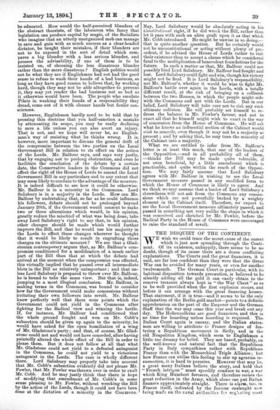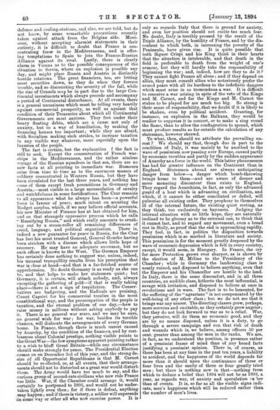THE DISQUIET OF THE CONTINENT.
WE wish we could trace the secret cause of the unrest which is just now spreading through the Conti- nent. Of its existence, unhappily, there seems to be no doubt, though of its cause there are a dozen conflicting explanations. The Courts and the great financiers, it is said, are far less confident than they were that the Great War can be avoided for many years, or even for another twelvemonth. The German Court in particular, with its habitual disposition towards precaution, is believed to be silently adding all the gold. it can easily obtain to the reserve treasure always kept in "the War Chest" so as to be well provided when the first explosion occurs, and before it can arrange with the great financing houses. That statement, if it is true—and it seems to be the only explanation of the Berlin gold market—points to a definite apprehension on the part of the Emperor and the German Staff that the war may come this year and break out any day. The Hohenzollerns are good financiers, and this is no time for hoarding unless hoarding is required. The- Italian Court again is uneasy, and the Italian states- men are willing to attribute to France designs of fos- tering a Republican movement in Sicily, and in the- old Neapolitan Kingdom, which seem to Englishmen a little too dreamy for belief. They are based, probably, on the well-known and natural fact that the Republican Party in Italy sympathises rather with Republican France than with the Monarchical Triple Alliance ; but how France can utilise this feeling to stir up agrarian in- surrection, it is hard to perceive. However that may le, a great many Italians believe the story, and hold that "French intrigue" must speedily conduce to war, a war which King Humbert foresees, and therefore resists the great reduction in the Army, which alone can put Italian finances approximately straight. There is alarm, too, in France itself, indicated by the furious onslaught now being made on the naval authoritics for 1)f:sliding coast defence and coaling-stations, and also, we are told, but do not know, by some remarkable precautions recently taken against attack from the Belgian side. More- over, without accepting alarmist statements in their entirety, it is difficult to doubt that France is con- centrating for in the Mediterranean, and is offer- ing temptations to Spain to join the Franco-Russian Alliance against its rival. Lastly, there is clearly alarm in Vienna as to the possible consequences of the situation in Servia, where an explosion is possible any day, and might place Russia and Austria in distinctly hostile relations. The great financiers, too, are letting most securities down, as they do when they foresee trouble, and so discounting the severity of the fall, while the rise of Consols may be in part due to the large Con- tinental investments which always precede and accompany a period of Continental disturbance. At all events, there is a general uneasiness which must be telling very heavily against commercial prosperity, as well as against that condition of their Treasuries about which all Continental Governments are most anxious. They fret under their heavy floating debts, which are a cause not only of anxiety, but in a way of humiliation, by making the financing houses too important ; while they are afraid, with Socialism making such strides, to increase taxation in any visible way whatever, more especially upon the ,luxuries of the people. The fact is certain, but the explanation f the fact is still to seek. Except the concentration of French war- ships in the Mediterranean, and the rather aimless voyage of the Russian squadron in that sea, there are no new facts at all pointing to immediate war. Rumours arise from time to time as to the enormous masses of soldiery concentrated in Western Russia, but they have been circulated for the last three years, and nothing has come of them except fresh precautions in Germany and Austria,—most visible in a large accumulation of cavalry and watchfulness in some fortifications. The Czar remains to all appearance what he always has been—a powerful force in favour of peace, much intent on securing the Budget surplus, which, if we may believe official accounts, his new Minister of Finance has at last obtained for him, and on that strangely oppressive process which he calls Russifying Russia," and which really amounts to crush- ing out by a steam-roller all remaining differences of creed, language, and political organisation. There is, indeed a new guarantee for peace in Russia, for the Czar has lost his most trusted General, General Gourko having been stricken with a disease which allows little hope of recovery. He may have an adequate successor, but no such officer is known to the West. The German Emperor has certainly done nothing to suggest war, unless, indeed, his unusual tranquillity results from his perception that war is close at hand—and that is a far-fetched source of apprehension. No doubt Germany is as ready as she can be, and that helps to make her statesmen quiet ; but Germany, it is certain, will attack nobody, and, always excepting the gathering of gold—if that is really taking place—there is not a sign of trepidation. The Conser- vatives are badgering, and the Radicals are praising, Count Caprivi for his commercial treaties in the most constitutional way, and the preoccupation of the people is taxation, and the eternal problem of our day,—how to raise nioney in millions without asking anybody to pay it. There is no general war scare, and we may be sure, no general wish for war ; for war, besides its terrible chances, will dislocate the arrangements of every German home. In France, though there is much unrest caused by Anarchy, by the condition of the finances, and by rest- lessness about Colonial prestige, nothing visible points to the Great War—the few symptoms apparent pointing rather to a wish to bluff Great Britain—while one circumstance should make strongly for peace. The Presidential Election -comes on on December 3rd of this year, and the strong de- sire of all Opportunist Republicans is that M. Carnot -should be re-elected, or, at all events, that their arrange- ments should not be disturbed as a great war would disturb -them. The Army would have too much to say, and the -curious group of second-rate civilians who now rule France too little. War, if the Chamber could arrange it, would -certainly be postponed to 1895, and would not be under- taken lightly even then ; for if there is defeat, anything :may happen ; and if there is victory, a soldier will supersede is 'some way or other all who now exercise power. It is only as regards Italy that there is ground for anxiety, and even her position should not excite too much fear.
No doubt, Italy is terribly pressed by the result of the Triple Alliance, by the hostility of France, and by the dis- content to which both, in increasing the poverty of the Peninsula, have given rise. It is quite possible that both Signor Crispi and his King think in their hearts that the situation is intolerable, and that death in the field is preferable to death from the weight of one's armour, but they will hardly take the responsibility of beginning the war ; and, indeed, how are they to do it ? They cannot fight France all alone; and if they depend on allies, they must consult allies who notoriously prefer the armed peace with all its burdens to the indefinite dangers which must arise in so tremendous a war. It is difficult to conceive a war arising in spite of the veto of the Kings and M. Carnot, and for the Kings and M. Carnot the stakes to be played for are much too big. So strong is their sense of responsibility, that we doubt if it is likely to be shaken, even by political accident. Granting, for instance, an explosion in the Balkans, they would be readier to suppress it in concert, or to make a ring round the flame, than to allow the conflagration to spread, which must produce results so far outside the calculation of any statesman, however shrewd.
To what, then, should we attribute the prevailing un- rest? We should say that, though due in part to the condition of Italy, it was mainly to be ascribed to the wave of pessimism now passing over Europe, caused partly by economic troubles and partly by the sudden appearance of Anarchy as a force in the world. This latter phenomenon has had far greater influence on the Continent than in England. Statesmen abroad are always anticipating danger from below—a danger which bomb-throwing brings home to them—and are aware of deeper and more menacing discontent than exists in England. They regard the Anarchists, in fact, as only the advanced guard of a host which is advancing on civilisation, and which, if it cannot be either conciliated or defied, will pulverise all existing order. They prophesy to themselves ill of the internal future, the existing quiet resting, as they think, too exclusively on bayonets. Judging the internal situation with so little hope, they are naturally inclined to be gloomy as to the external one, to think that it cannot last, and to regard any movement, even a bread riot in Sicily, as proof that the end is approaching rapidly. They feel, in fact, in politics the disposition towards pessimism which is so marked in literature and society. This pessimism is for the moment greatly deepened by the wave of economic depression which is felt in every country, except, it would seem, in Hungary. In France, the cry for more Protection grows ever sharper, as is shown by the election of M. Menne to the Presidency of the Chamber ; while in Germany the landowning class is nearly ruined, and disposed to believe anything, even that the Emperor and his Chancellor are hostile to the land. In Italy, there is the same discomfort, and in all three countries, an audible class, hitherto the most influential, is savage with irritation, and disposed to believe at once in revolutions and in wars. The fact is to be lamented, for the suffering of the " agrarians " is not compensated by the well-being of any other class ; but we do not see that it brings war any nearer. The directing classes grow, perhaps, more nervous and excitable, as they certainly grow angrier; but they do not look forward to war as to a relief. War, they perceive, will do them no economic good, and they are by no means disposed, unless it is a duty, to go through a severe campaign and run that risk of death and wounds which is, we believe, among officers 50 per cent. greater than among the men in the ranks. We are, in fact, as we understand the position, in -presence rather of a pessimist frame of mind than of any broad facts justifying a pessimist opinion. There is, of course, as there has been at any time in the past ten years, a liability to accident, and the happiness of the world depends far more than it should upon the continuance of three or four lives and the sanity of three or four greatly tried. men ; but there is nothing new in that—nothing from which to deduce a belief that 1894 will not be as 1893, a year, as regards war, of anxiety and speculation ia'her than of events. It is, so far as all the visible signs indi- cate, men's happiness which will be reduced rather than. the number of men's lives.







































 Previous page
Previous page